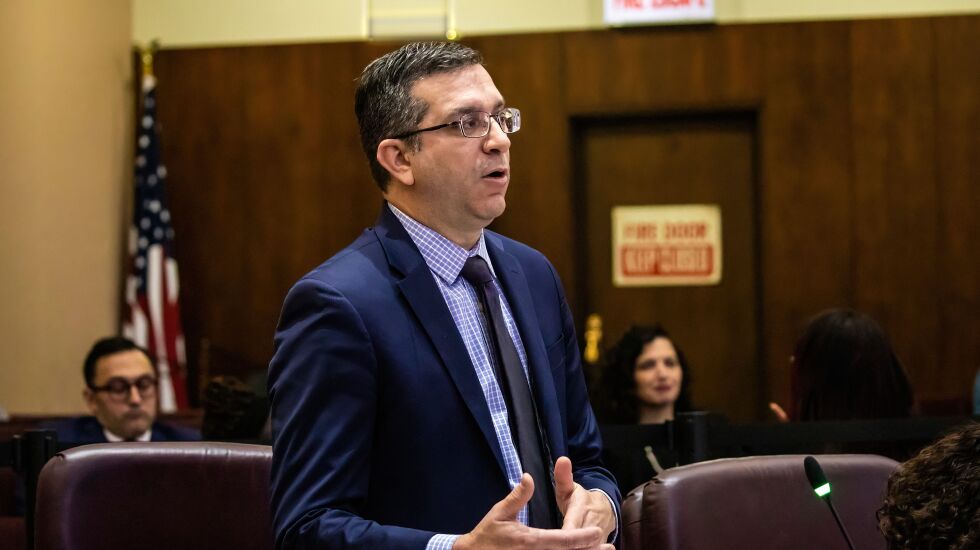
Mayor-elect Brandon Johnson was warned Thursday to “leave this alone” and make no changes to the City Council reorganization approved last month before the new mayor and Council can even be sworn in.
The Chicago Sun-Times reported this week that Johnson allies and transition team advisers were working behind the scenes to put the mayor-elect’s stamp on the new Council by tweaking the reorganization and installing more Johnson loyalists as key committee chairs.
Several City Hall sources identified Finance Chair Scott Waguespack (32nd), Aviation Chair Matt O’Shea (19th) and License Chair Emma Mitts (37th) — as well as Ald. Marty Quinn (13th) and Ald. Debra Silverstein (50th), chairs of the newly-created committees on Executive Appointments and Building Standards — as among those who could be on the chopping block to make way for more of Johnson’s team.
But Thursday, Waguespack cautioned Johnson to back off or risk an embarrassing defeat in, what would be the first test of his City Council muscle.
“It comes down to the votes. ... I know that we have the votes right now — as we had the votes for passing the initial group of chairs” on March 30, Waguespack told the Sun-Times, pointing to the 34-to-10 and 33-11 votes that ratified the reorganization plan.
Waguespack noted Ald. Carlos Ramirez-Rosa (35th) and Budget Committee Chair Pat Dowell (3rd), whom sources have identified as being among the Johnson allies working to undermine the reorganization, have “been at the table from the beginning.”
Waguespack has told associates Dowell called him recently to say she wants to be Finance Committee chair in the new City Council.
Dowell refused to confirm that. Ramirez-Rosa called reports that he is spearheading the changes on Johnson’s behalf “fake news.”
Even if Johnson manages to change enough votes to support the leadership changes he wants to make, Waguespack warned the new mayor he’d be making a mistake.
It would be the same mistake Mayor Lori Lightfoot made in using her inaugural address to denounce the City Council as corrupt and shame alderpersons into a standing ovation for reform.
“I don’t think anybody wants to have that kind of fight. We’re all working to make sure the city can move forward. But if you’re looking at just spending your time on undermining the independence effort and the co-equal branch effort that the Council has undertaken for the first time ever, it’s not starting off on a good foot,” Waguespack said.
“There’s a lot of other issues on the table. … What happened this past weekend with police. What kind of summer we’re gonna see. You have a transition team … that needs to get a lot of work done. You have to basically deal with 50 different agencies and the issues that they’re going through as well as departments. If I were mayor, I would really be focused on those issues and making sure that I’m ready to start off on the front foot and probably leave this alone.”
Waguespack also said Johnson will face both legal and political resistance on at least some of the $800 million in new or increased taxes he has proposed to bankroll the array of jobs, education and social programs that form the cornerstone of his anti-violence strategy.
“When you look at the head tax, a lot of us voted to phase that out because it was detrimental to bringing business to this city. When you look at the financial transaction tax, we’ve had hearings and talked to those people. … You’re on the cloud and you just move your headquarters to another location,” Waguespack said.
“If you look at the hotel industry, the entertainment industry, our bars, our restaurants — they’re struggling mightily trying to get not only customers back in but staff to work in those places. … To hit them with another tax would probably send a lot of them into bankruptcy or worse.”
Waguespack stuck with Lightfoot until the bitter end, only to have her third-place finish on Feb. 28 make her the first elected Chicago mayor in 40 years denied a second term.
He argued the pandemic forced the lame-duck mayor to make “tough and very difficult decisions” to close restaurants, parks, beaches and schools that “didn’t make people happy.” He acknowledged the “tough manner” in which Lightfoot made those decisions “turned some people off.”
Even so, Waguespack said that had Lightfoot simply heeded the advice he gave her a year ago to fire recently departed Chicago Police Supt. David Brown, she might have won a second term.
“He made some critical errors and critically bad moves, but she was trying to get through a period with him. They wanted to have consistency and show that they had leadership at the top,” Waguespack said.
“But it was a big mistake.”







